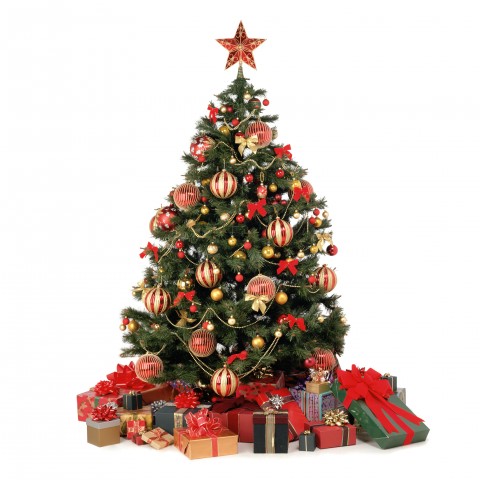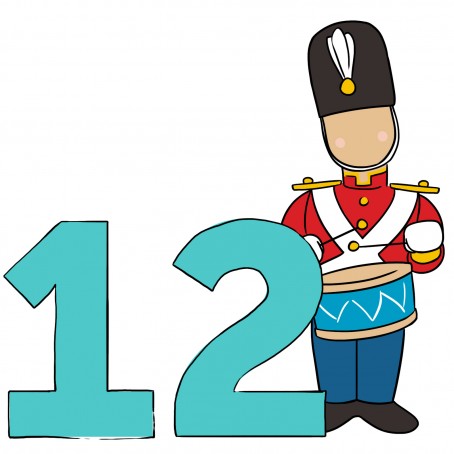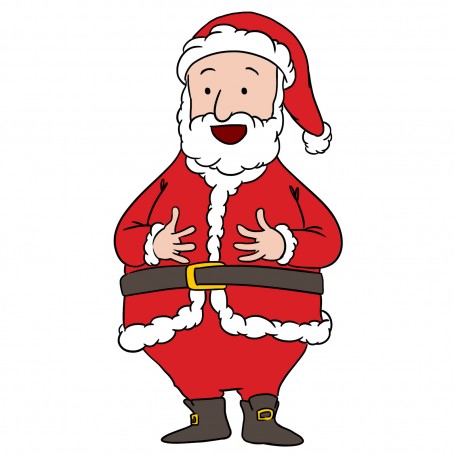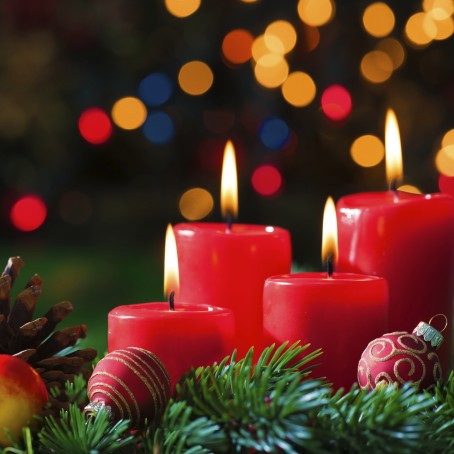Do you know any ways to wish someone a ‘Merry Christmas’ in Russian? RussianPod101 brings you easy-to-learn translations and the correct pronunciation of Russian Christmas phrases!
Christmas is the annual commemorative festival of Christ’s birth in the Western Christian Church. It takes place on December 25th and is usually celebrated with much food and fanfare! However, not all cultures celebrate Christmas. In some countries, Christmas is not even a public holiday! However, many countries have adapted Christmas and its religious meaning to tally with their own beliefs, or simply in acknowledgment of the festival’s importance to other cultures. If you want to impress native Russian speakers with culturally-appropriate Christmas phrases and vocabulary, RussianPod101 will teach you the most important ways to wish someone a ‘Merry Christmas’ in Russian!
Table of Contents
- How to Celebrate Christmas in Russia
- Holiday Greetings and Wishes
- Must-Know Christmas Day Vocabulary
- Twelve Days of Christmas
- Top 10 Christmas Characters
- How RussianPod101 Can Help You
1. How to Celebrate Christmas in Russia
Did you know that in Russia people don’t give presents for Christmas? Let’s discuss how people celebrate Christmas in Russia.
Now, before we go into more detail, I’ve got a question for you – why is Christmas in Russia celebrated on January 7 and not on December 25?
If you don’t already know, you’ll find out a bit later. Keep reading.
Christmas, or as it’s known in Russian Рождество (Razdestvo), is actually observed in Russia on January 7. It’s a state holiday and a day off. As is the same in all Christian nations, Christmas in Russia is a celebrated as the birth of Jesus Christ. In Russian, Jesus Christ is called Иисус Христос (Iisus Khristos).
Christmas in Russia is a warm, family-centric holiday which most Russian people try to spend at home. In Russia, It’s not customary to give each other presents for Christmas, there is no Santa Claus, and people don’t especially decorate a Christmas tree. On this holy day, a great number of people attend celebratory church services, make confessions, and receive communion. It’s customary to serve Russian food on a festive table, pork dishes such as aspic or холодец (Khaladets) in Russian, homemade sausages, and ragout.
The day before Christmas is called Сочельник (Sachel’nik), which means Christmas Eve. The word сочельник meaning “Christmas Eve” comes from the word сочиво (sochiva). Сочиво (sochiva) is a meatless porridge made from wheat with a little honey added. It’s customary to make twelve meatless dishes for Christmas Eve, among which there should be sochiva, a porridge made from wheat, millet, rice or other grains with added poppy seeds, walnuts, raisins, and honey. Tradition dictates that all twelve dishes must be sampled, but none should be eaten completely in order to ensure that there will always be prosperity in the family.
On Christmas Eve, the Orthodox churches are decorated with a Nativity scene including small models of Bethlehem Cave. In Russian, the Bethlehem Cave is called Вифлеемская пещера (Vifleyemskaya peshchera) with small figures inside. The Nativity scene depicts the birth of Christ. The main decorations of the Nativity scene are the manger with the baby Jesus, the Virgin Mary, or Дева Мария (Deva Maria), and Joseph, or Иосиф (Iosif).
In Russia, the tradition of Christmas divinations has been preserved right up until this day. Divinations made on the night of January 6 are considered the most accurate and truthful. On that night, young maidens request divinations about who their betrothed will be and when they will find love.
So then, why is Christmas celebrated on January 7 and not on December 25 in Russia?
It’s all because of the calendar. The Russian orthodox church uses the Julian calendar, or “The old calendar”. December 25th on the Julian calendar corresponds to January 7th on the Gregorian calendar.
2. Holiday Greetings and Wishes for the Holiday Season
1- Merry Christmas!
Счастливого Рождества!
Schastlivogo Rozhdestva!
Do you know how to say ‘Merry Christmas’ in Russian? Learn here how to pronounce it perfectly! ‘Merry’ means to be joyful, to celebrate and generally be in good spirits. So, with this phrase you are wishing someone a joyful, celebratory remembrance of Christ’s birth!
2- Happy Kwanzaa!
Счастливой Кванзы!
Schastlivoy Kvanzy!
Surprise your African-American, or West African native friends with this phrase over the Christmas holidays! Kwanzaa is a seven-day, non-religious celebration, starting on Dec 26th each year. It has its roots in African American modern history, and many people celebrate both Kwanzaa and Christmas!
3- Have a happy New Year!
Счастливого Нового года!
Schastlivogo Novogo goda!
In countries where Christmas is not officially celebrated, but a Gregorian calendar is observed, this would be a friendly festive-season wish over New Year.
4- Happy Hanukkah!
Счастливой Хануки!
Schastlivoy Khanuki!
Hanukkah is the beautiful Hebrew festival over November or December each year. It is also called the ‘Festival of Lights’ and is celebrated to commemorate the Jewish freedom of religion.
5- Have a great winter vacation!
Весёлых зимних каникул!
Vesolykh zimnikh kanikul!
This is a good phrase to keep handy if someone doesn’t observe any religious festival over the Christmas holidays! However, this will only be applicable in the Northern hemisphere, where it is winter over Christmas.
6- See you next year!
Увидимся в новом году!
Uvidimsya v novom godu!
Going away on holiday over Christmas season, or saying goodbye to someone about to leave on vacation? This would be a good way to say goodbye to your friends and family.
7- Warm wishes!
тёплые пожелания!
toplyye pozhelaniya!
An informal, friendly phrase to write in Russian Christmas cards, especially for secular friends who prefer to observe Christmas celebrations without the religious symbolism. It conveys the warmth of friendship and friendly wishes associated with this time of year.
8- Happy holidays!
Весёлых праздников! Весёлых праздников!
Vesyolykh praznikaf!
If you forget how to say ‘Merry Christmas!’ in Russian, this is a safe, generic phrase to use instead.
9- Enjoy the holidays!
Наслаждайтесь праздниками!
Naslazhdaytes’ prazdnikami!
After saying ‘Merry Christmas’ in Russian, this would be a good phrase with which to wish Christmas holiday-goers well! It is also good to use for secular friends who don’t celebrate Christmas but take a holiday at this time of the year.
10- Best wishes for the New Year!
Всего самого лучшего в Новом году!
Vsevo samava luchsheva v Novam gadu!
This is another way of wishing someone well in the New Year if they observe a Gregorian calendar. New Year’s day would then fall on January 1st.
3. Must-Know Christmas Day Vocabulary
Christmas is associated with many traditions and religious symbols in multiple countries across the world. It originated centuries ago in the West with the birth of Christianity, and the celebrations are often embedded with rich cultural significance. So, by now you know how to say Merry Christmas in Russian! Next, learn pertinent vocabulary and phrases pertaining to Christmas, as well as how to pronounce them correctly. At RussianPod101, we make sure you sound like a native speaker!
1- Christmas
Рождество
Rozhdestvo
This is the Russian word for ‘Christmas’. Most happy Christmas wishes in Russian will include this word!
2- Snow
снеговик
snegovik
In most Northern-hemisphere countries, Christmas is synonymous with snow, and for Christmas, the snowman is often dressed as Santa Claus.
3- Snowflake
снежинка
snezhynka
Snowflakes collectively make up snow. A single snowflake is small, white, light like a feather and icy cold! When put under a microscope, the snowflake reveals itself to have the most beautiful, symmetrical patterns. These patterns have become popular Christmas decorations, especially in Western countries.
4- Snowman
снеговик
snegovik
As you guessed – a snowman is only possible to build if it is snowing! What a fun way to spend Christmas day outside.
5- Turkey
индейка
indeyka
Roast turkey is the traditional main dish on thousands of lunch tables on Christmas day, mainly in Western countries. What is your favorite Christmas dish?
6- Wreath
гирлянда
girlyanda
Another traditional Western decoration for Christmas, the wreath is an arrangement of flowers, leaves, or stems fastened in a ring. Many families like to hang a Christmas wreath outside on their houses’ front doors.
7- Reindeer
северный олень
severnyy olen’
Reindeer are the animals commonly fabled to pull Santa Claus’ sled across the sky! Western Christmas folklore tells of Father Christmas or Santa Claus doing the rounds with his sled, carrying Christmas presents for children, and dropping them into houses through the chimney. But who is Santa Claus?
8- Santa Claus
Санта Клаус
Santa Klaus
Santa Claus is a legendary and jolly figure originating in the Western Christian culture. He is known by many names, but is traditionally depicted as a rotund man wearing a red costume with a pointy hat, and sporting a long, snow-white beard!
9- Elf
эльф
el’f
An elf is a supernatural creature of folklore with pointy ears, a dainty, humanoid body and a capricious nature. Elves are said to help Santa Claus distribute presents to children over Christmas!
10- Rudolph the Red-Nosed Reindeer
оленёнок Рудольф
olenyonok Rudol’f
‘Rudolph the Red-Nosed Reindeer’ is a Christmas song based on an American children’s story book with the same name. Rudolph is one of Santa’s reindeer. The song became more famous than the book, and can still be heard playing in many shopping malls over Christmas time across the globe!
11- North Pole
Северный полюс
Severnyy polyus
The cold North Pole is where Santa Claus is reputed to live with his reindeer!
12- Sled
санки
sanki
A sled is a non-motorised land vehicle used to travel over snow in countries where it snows a lot, and is usually pulled by animals such as horses, dogs or reindeer. This one obviously refers to Santa’s sled! Another word for sled is sleigh or sledge.
13- Present
подарок
podarok
Gift or present giving is synonymous with Christmas Eve and the greatest source of joy for children over this festive time! This tradition signifies that Christ’s birth was a gift to mankind, but not all people who hand out presents over Christmas observe the religious meaning.
14- Bell
колокол
kolokol
On Christmas Day, or Christmas Eve, many religious celebrants enjoy going to church for a special sermon and Christmas rituals. The start of the sermon is often announced with bells or a bell, if the church has one. For this reason, the sound of ringing bells is often associated with Christmas Day.
15- Chimney
труба
truba
The chimney is the entrance Santa Claus uses to deliver children’s presents on Christmas Day, according to folklore! Wonder how the chubby man and his elves stay clean…?!
16- Fireplace
камин
kamin
In most countries where it snows, Christmas is synonymous with a fire or burning embers in houses’ fireplaces. Families huddle around its warmth while opening Christmas presents. Also, this is where Santa Claus is reputed to pop out after his journey down the chimney!
17- Christmas Day
Рождество Христово
Razhdestvo Khristova
This is the official day of commemorative celebration of Christ’s birth, and falls each year on December 25.
18- Decoration
украшение
ukrasheniye
Decorations are the colourful trinkets and posters that make their appearance in shops and homes during the Christmas holiday season in many countries! They give the places a celebratory atmosphere in anticipation of the big Christmas celebration. Typical Christmas decorations include colorful photographs and posters, strings of lights, figurines of Santa Claus and the nativity scene, poinsettia flowers, snowflakes and many more.
19- Stocking
чулок
chulok
According to legend, Santa Claus places children’s presents in a red stocking hanging over the fireplace. This has also become a popular decoration, signifying Christmas.
20- Holly
падуб
padub
Holly is a shrub native to the UK, and parts of Europe, Africa and Asia. It is characterised by glossy, spiny-toothed leaves, small, whitish flowers, and red berries. Ironically, its significance for Christmas relates to Christ’s crucifixion and suffering rather than his birth. However, the leaves’ distinctive shape and image have become popular Christmas decorations.
21- Gingerbread house
пряничный домик
pryanichnyy domik
According to legend, the gingerbread house synonymous with Christmas is related to Christ’s birth place, Bethlehem. Bethlehem literally means ‘House of Bread’. Over centuries, it has become a popular treat over Christmas time in many non-religious households as well.
22- Candy cane
леденец
ledenets
According to folklore, Christmas candy canes made their appearance first in Germany in the 16th century. A choir master gave children the candy canes to suck on in church in order to keep them quiet during the Christmas sermon! Apparently, the candy is shaped like a cane in remembrance of the shepherds who were the first to visit the baby Jesus. Today, like gingerbread houses, they are still a popular sweet over the festive season!
23- Mistletoe
омела
omela
Mistletoe is a parasitic plant that grows on certain trees. In the Middle Ages, it was believed that the mistletoe has magical powers, and could protect a household from evil if hung above a door during December. The belief didn’t last but the habit did, and the mistletoe is another popular Christmas decoration!
4. Twelve Days of Christmas
Wow, you’re doing extremely well! You know how to wish someone a Merry Christmas in Russian, and you learned pertinent vocabulary too! The Twelve Days of Christmas is not very well known in modern times, so, you’re on your way to becoming an expert in Christmas traditions and rituals. Well done!
The Twelve Days of Christmas, also known as Twelvetide, is a traditional festive period of 12 days dedicated to celebrate the nativity of Christ. Christmas Day is, for many who observe Twelvetide, the first day of this period.
‘The Twelve Days of Christmas’ is also a popular Christmas song about a series of gifts given on each day of Twelvetide. According to experts, these gifts were created as a coded reference to important symbols in the Christian church. Here is a list of those gifts mentioned in the song! Do you recognise them?
5. Top 10 Christmas Characters in American Culture
This is fantastic, you know how to explain almost everything about Christmas in Russian! However, do you know the most popular Christmas characters in American culture? Your knowledge will not be complete without this list.
6. RussianPod101 Is One Of The Best Online Language Schools Available!
We don’t just say this – we can prove it! Geared to your personal needs and goals, we have several learning paths from which to choose. From Russian for Absolute Beginners to Advanced Russian, lessons are designed to meet you where you are, and increase your language abilities in fun, easy and interactive lessons! Mastering a new language has never been this easy or enjoyable.
We have over a decade of experience and research behind us, and it shows! With thousands of audio and video lessons, detailed PDF lessons and notes, as well as friendly, knowledgeable hosts, RussianPod101 is simply unbeatable when it comes to learning correct Russian. Plenty of tools and resources are available when you study with us. New lessons are added every week so material remains fresh and relevant. You also have the option to upgrade and enjoy even more personalised guidance and services. This is a sure way to fast-track your learning!
So, this Christmas, why don’t you give yourself a present and enroll in RussianPod101? Or give an enrollment as a present to a loved one. It will be a gift with benefits for a whole lifetime, not just over Christmas!

















